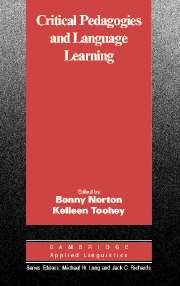Book contents
- Frontmatter
- Contents
- List of contributors
- Acknowledgments
- Chapter 1 Critical pedagogies and language learning: An introduction
- I RECONCEPTUALIZING SECOND LANGUAGE EDUCATION
- Chapter 2 Two takes on the critical
- Chapter 3 Critical multiculturalism and second language education
- Chapter 4 Gender and sexuality in foreign and second language education: Critical and feminist approaches
- Chapter 5 Assessment in multicultural societies: Applying democratic principles and practices to language testing
- II CHALLENGING IDENTITIES
- III RESEARCHING CRITICAL PRACTICES
- IV EDUCATING TEACHERS FOR CHANGE
- Author Index
- Subject Index
Chapter 3 - Critical multiculturalism and second language education
Published online by Cambridge University Press: 05 October 2012
- Frontmatter
- Contents
- List of contributors
- Acknowledgments
- Chapter 1 Critical pedagogies and language learning: An introduction
- I RECONCEPTUALIZING SECOND LANGUAGE EDUCATION
- Chapter 2 Two takes on the critical
- Chapter 3 Critical multiculturalism and second language education
- Chapter 4 Gender and sexuality in foreign and second language education: Critical and feminist approaches
- Chapter 5 Assessment in multicultural societies: Applying democratic principles and practices to language testing
- II CHALLENGING IDENTITIES
- III RESEARCHING CRITICAL PRACTICES
- IV EDUCATING TEACHERS FOR CHANGE
- Author Index
- Subject Index
Summary
It is commonly believed that ESL (English as a second language), EFL (English as a foreign language), or other second language educators are naturally sensitive to cultural and linguistic diversity. In educational institutions, they are usually regarded as liberal advocates for multiculturalism and diversity, striving to model for their colleagues and students. Qualities required for this liberal stance, which I shall call liberal multiculturalism, include open-mindedness and nonprejudiced attitudes in interacting with people with diverse racial, ethnic, and linguistic backgrounds. These qualities encourage acceptance of unfamiliar beliefs as well as appreciation of foreign customs and artifacts. In schools, liberal multiculturalism is manifested in annual cultural diversity events and fairs. In teacher training, the liberal approach to multiculturalism tends to focus on imparting information about the cultural values, customs, and way of life among various ethnic groups. While liberal multiculturalism values and appreciates cultural differences, it also supports the idea that all people, regardless of their backgrounds, are equal and should have equal opportunities in society. This egalitarianism leads to the view that each individual's academic and economic success is dependent upon his or her own effort. In short, liberal multiculturalism promotes tolerance, acceptance, and respect toward different cultures and culturally diverse people while supporting equality among them.
In my observations as a second language K-12 teacher-educator and researcher in the United States, second language educators often fit into the image of well-meaning liberal multiculturalists.
Information
- Type
- Chapter
- Information
- Critical Pedagogies and Language Learning , pp. 30 - 52Publisher: Cambridge University PressPrint publication year: 2004
Accessibility standard: Unknown
Why this information is here
This section outlines the accessibility features of this content - including support for screen readers, full keyboard navigation and high-contrast display options. This may not be relevant for you.Accessibility Information
- 126
- Cited by
